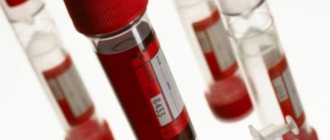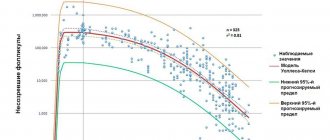Reference values
The table shows normal values of follicle-stimulating hormone depending on gender, age and phase of the menstrual cycle (for women).
| Floor | Age | Follicle-stimulating hormone level, mIU/ml | Extended comment |
| Female | 0 - 1 year | 1,84 — 20,26 | |
| 15 years | 0,6 — 6,12 | ||
| 6 – 10 years | 0 — 4,62 | ||
| 11 – 14 years | 0,19 — 7,97 | Reproductive period: | |
| Follicular phase: 1.37 - 9.90 | |||
| Ovulatory phase: 6.17 - 17.20 | |||
| Luteal phase: 1.09 - 9.20 | |||
| 15 – 20 years | 0,57 — 8,77 | Reproductive period: | |
| Follicular phase: 1.37 - 9.90 | |||
| Ovulatory phase: 6.17 - 17.20 | |||
| Luteal phase: 1.09 - 9.20 | |||
| over 21 years old | Reproductive period: | ||
| Follicular phase: 1.37 - 9.90 | |||
| Ovulatory phase: 6.17 - 17.20 | |||
| Luteal phase: 1.09 - 9.20 | |||
| Postmenopause: 19.30 - 100.60 | |||
| Male | 0 - 1 year | < 3,5 | |
| 15 years | < 1,45 | ||
| 6 – 10 years | < 3,04 | ||
| 11 – 14 years | 0,36 — 6,29 | ||
| 15 – 20 years | 0,49 — 9,98 | ||
| over 21 years old | 0,95 — 11,95 | ||
How to prepare for a blood test for FSH
To carry it out, blood is taken from a vein in the morning on an empty stomach. Since the FSH level increases in pulse mode, it is advisable to take blood samples at least 3 times every 30 minutes to obtain objective data.
Before donating blood, you need to prepare to eliminate the influence of external and internal factors on the results. Firstly, the last meal should be no later than 22-00; you can drink water in the morning, although many experts do not recommend this. Secondly, 3 days before the FSH analysis, you should exclude alcohol, physical activity, and fatty foods. Thirdly, blood is donated for FSH a week after stopping any drug treatment; if it is impossible to interrupt the course of therapy, then this point is discussed with the doctor. Also, many experts do not recommend performing FSH analysis after an X-ray or ultrasound examination.
You can get tested for FSH and other hormones at the IVF Center in Kaliningrad. Experienced specialists of the center will conduct all the necessary studies to identify pathology, answer your questions, and also draw up an adequate course of therapy.
Follicle stimulating hormone
Follicle-stimulating hormone is a substance synthesized in the pituitary gland.
The main function of this hormone is to regulate the functioning of the gonads (ovaries in women and testes in men). In the embryonic (intrauterine) period and before puberty, the formation of follicle-stimulating hormone is constant and its concentration remains at a low level. During human puberty, active synthesis of follicle-stimulating hormone by the pituitary gland begins and its release into the blood. With the bloodstream, the hormone enters target cells (cells of the body, on the surface of which there are receptors for the attachment of follicle-stimulating hormone).
In men, the target cells that follicle-stimulating hormone acts on are located in the testes and are called Sertoli cells. By acting on Sertoli cells, follicle-stimulating hormone regulates spermatogenesis (the process of sperm formation).
During puberty, eggs begin to form in the ovaries in women, going through several stages of maturation - this process is cyclical (repeated approximately every 28 days) and is called the menstrual cycle. In the first phase of the menstrual cycle, follicle-stimulating hormone, joining its receptors in the ovaries, stimulates the onset of maturation of several follicles (a follicle is a structural unit of the ovaries, it is an egg surrounded by several layers of cells like a membrane). Only one follicle will reach maturity, which has a greater number of receptors for follicle-stimulating hormone. Thus, the concentration of follicle-stimulating hormone increases during the maturation of the follicle, reaching a peak at the time of ovulation (the release of the egg from the membrane around the 14th day of the cycle), and then decreases under the influence of estrogen (the female sex hormone), which prevents the development of other follicles. Typically, one egg is produced each cycle.
Follicle-stimulating hormone plays a fundamental role in male and female fertility (the body's ability to produce viable offspring). Diseases affecting the hypothalamus, pituitary gland and/or ovaries or testes can cause too much or too little follicle-stimulating hormone to be produced, leading to various conditions - infertility, abnormal menstrual cycles, early (premature) puberty or delayed puberty .
When to take an FSH blood test
The indications for the analysis are quite wide, so it can be performed at any age. In men, FSH analysis can be performed on any day, since its concentration is quite stable, but in women, the analysis is performed at a certain period.
Most often, the study is performed on days 6-7 of the menstrual cycle, although the time of the analysis can be regulated by the doctor and depend on various circumstances. It is worth noting that women, in addition to FSH analysis, undergo a study of the FSH/LH ratio. Normally, before the onset of the first menstruation it is 1, a year after menarche it increases to 1.5, after 2 years it increases even more, does not exceed 2, this ratio remains until menopause.
Reasons for increased levels of follicle-stimulating hormone in the blood
Among women:
- Primary ovarian failure (loss of ovarian function before age 40).
- Polycystic ovary syndrome (PCOS) is a common hormonal disorder found in women of childbearing age. This is one of the main causes of female infertility.
- Beginning of menopause or perimenopause.
- Ovarian tumor.
- Endometriosis.
- Turner syndrome is a genetic disorder that affects female sexual development and often causes infertility.
For men:
- Damage to the testes due to chemotherapy, radiation, infection, or alcohol abuse.
- Klinefelter syndrome, a genetic disorder that affects male sexual development and often causes infertility.
Indications for taking an FSH test
If you suspect disorders of the reproductive system, it is necessary to determine the level of hormones in the blood, including a blood test. This study is used to identify the causes of infertility, diagnose spermatogenesis disorders, and determine primary and secondary sexual dysfunction. FSH analysis also helps determine the phase of the menstrual cycle, register early or late puberty and monitor hormonal therapy.
Indications for taking a hormone test are:
- Decreased libido
- Potency disorders in men
- Suspicion of pituitary pathology
- Amenorrhea
- Menstrual irregularities
- Lack of ovulation
- Uterine bleeding
- Delayed growth and puberty
- Miscarriage
- Infertility in men and women
- Preparation for the IVF protocol
Prolactin and FSH
These are hormones that are interconnected. When prolactin levels increase, follitropin, LH, and estradiol fall. This condition is considered normal during pregnancy - prolactin rises, and FSH, LH, estradiol fall. Prolactin prevents the development of follicles and the onset of ovulation, thus helping to maintain pregnancy. Increased prolactin, and decreased others, is observed during breastfeeding. Prolactin is responsible for lactation, milk production and filling of the mammary glands.
Analysis transcript
The results of the FSH analysis can refute or confirm fears; they can be within the normal range, increased or decreased. An increase in hormone concentration is observed in the following situations:
- Menopause period (normal variant)
- Primary ovarian dysfunction (premature ovarian failure, ovarian cyst, neoplasm, hereditary disorders, etc.)
- Primary testicular failure (testicular underdevelopment, neoplasms, genetic disorders, etc.)
- Hyperfunction or tumors of the pituitary gland
- Endometriosis
- Feminization
- Formation of a hormone-producing tumor
- Early puberty
- Alcoholism
Most of these causes cause reproductive disorders, in particular infertility.
A decrease in FSH concentration is detected when:
- GnRH deficiency
- anovulatory menstrual cycle
- obesity
- pituitary insufficiency
- dwarfism
- excess prolactin production
- neoplasms of the ovaries and testicles with increased secretion of estrogen or testosterone
- polycystic ovary syndrome
- hemochromatosis
- fasting
- anorexia
- Sheehan's syndrome
A reduced concentration of this hormone leads to hypogonadism and a gradual shutdown of the functional activity of the gonads.
How does GnRH affect FSH synthesis?
Secretion of follicle-stimulating hormone occurs when stimulated by the hypothalamic peptide - gonadotropin-releasing hormone (GnRH). The mechanism of action of GnRH on the secretion of gonadotropins consists of such stages as the binding of GnrH to gonadotroph receptors, the effect on the plasma membrane, and the release of FSH into the blood.
The duration of existence of glycoprotein hormones is significantly influenced by the percentage of sialic acid: the higher its content in the hormone molecule, the longer their circulation time. The half-life of LH circulation is 1 hour.
What symptoms indicate low FSH levels?
Women need to see a doctor and get examined if they note:
- menstrual irregularities, especially complete cessation of menstruation, not associated with menopause;
- lack of ovulation (release of a mature egg from the ovary);
- bloody discharge from the genital tract outside of menstruation;
- decreased sex drive;
- changes in appearance: the appearance of wrinkles, poor hair growth.
- infertility
Men should pay attention to the following signs:
- violation of potency;
- decreased sex drive;
- decrease in testicular volume;
- infertility.
If follitropin levels are reduced in adolescents, premature or, conversely, delayed sexual development may indicate a problem.
The level of FSH in the blood is reduced
If a blood test shows a woman has a low level of the hormone, she may complain of symptoms such as lack of ovulation, scanty periods, infertility and breast atrophy.
The reasons for the low level may be:
- hyperprolactinemia;
- pituitary dwarfism;
- Simmonds disease;
- obesity;
- Sheehan syndrome (polycystic ovaries);
- dysfunction of the hypothalamus or pituitary gland;
- amenorrhea (absence or cessation of menstruation).
In addition, the level of follicle-stimulating hormone is reduced during pregnancy or long-term use of anabolic and steroid drugs. It has also been noted that low FSH occurs in people who go on long-term diets or fasting.
Low levels in men are usually manifested by testicular atrophy, impotence, and lack of sperm in the ejaculate. A reduced level can be observed when the pituitary gland is malfunctioning. In representatives of both sexes, with a decrease in the production of this gonadotropic hormone, a decrease in libido, a decrease in body hair growth and the earlier appearance of wrinkles on the skin are observed.
Complexes with this research
Advanced male anti-aging diagnostics Extended monitoring of key indicators in men aged 40+ 33,710 RUR Composition
Fitness monitoring Examination for choosing physical activity and monitoring the body's condition 6,780 RUR Composition
Check-up No. 1 for children and adolescents Annual preventive examination program RUB 10,950 Composition
IN OTHER COMPLEXES
- Male hormones RUR 6,180
- Fitness control of sports nutrition 5 140 RUR
- Anti-aging diagnostics in postmenopause RUB 12,630
- Female hormones. Menopause RUR 2,220
- Anti-aging diagnostics. Hormonal balance RUB 6,250
What functions does FSH perform?
Under the influence of this hormone, the physical and sexual maturation of the child occurs.
In teenage boys, thanks to FSH, the process of formation and maturation of sperm (spermatogenesis) begins, which then continues throughout the man’s life. In addition, the hormone affects the production of the main male hormone - testosterone, which affects both libido and the quality of germ cells.
In a woman’s body, under the influence of follitropin, the following occurs:
- growth and maturation of follicles in the ovaries;
- estrogen production;
- release of an egg from the ovary (ovulation). In this case, FSH works in tandem with LH (luteinizing hormone).
It must be kept in mind that gonadotropins (LH and FSH) interact with sex steroids - sex hormones. These include, in particular, testosterone and estradiol. Moreover, in this case the feedback principle works: the fewer gonadosteroids produced in the body, the higher the level of gonadotropins. Conversely, an excess of sex hormones leads to a decrease in FSH levels.
FSH activates sexual function
FSH and LH activate both functions of the gonads - generative and hormone-forming. FSH mainly affects the epitheliospermatogenic layer of the testicles and the germinal function of the testes. LH regulates the functions of glandulocytes. The interactions between LH and FSH are quite complex: they jointly regulate the germinal function of the testis. By negative feedback mechanisms, peptide inhibins inhibit the follicle-stimulating function of the pituitary gland. This leads to a decrease in the strength of the effect of FSH on the testes, but does not weaken the effects of LH. Thus, inhibin regulates the interaction of LH and FSH, which manifests itself in the regulation of testicular functions.
Features of the study
Analysis for LH and FSH is necessary for diagnosing infertility, identifying the causes of menstrual disorders, determining ovulation, and monitoring hormonal stimulation during IVF.
For analysis, the doctor assigns the woman a specific date, approximately the 3-7th day of the onset of menstruation. Preparation for the procedure is carried out 3 days in advance. At this time, physical and psycho-emotional stress, sports activities, physiotherapy, thermal procedures, and intimacy are excluded. Venous blood is collected in the morning on an empty stomach; smoking and drinking water are prohibited.
To determine the level of LH and FSH, serum or blood plasma is analyzed using the immunochemiluminescence method, which allows even frozen samples to be examined.
If a woman has an irregular, too long or short cycle, then a single test may produce false results. To get more reliable results, do 2-3 samples at half-hour intervals. For analysis, samples of all sera are combined.
The results of studies of the hormone FSH and luteotropin may be distorted not only due to an unstable cycle.
They can be affected by hormonal or radioisotope drugs taken by the patient, pregnancy, an MRI or radiation therapy session performed the day before, drinking alcohol, smoking, severe stress, taking medications that affect the production of gonadotropic hormones, anticonvulsants, and oral contraceptives.
Results sent successfully. Please check your email.
Clear results
Small and large growth of female egg follicles
Small follicular growth begins in the ovaries of the embryo and does not depend on pituitary hormones. This results in the development of follicles with a small cavity (primordial follicles). Further “big growth” occurs when adenopituitary FSH stimulates the production of estrogen by follicular epithelial cells and with the additional influence of LH in a small concentration (activates interstitial cells). The increasing content of LH in the blood towards the end of follicle growth causes ovulation and the formation of the corpus luteum.
The phase of production and secretion of progesterone by the corpus luteum is enhanced and lengthened due to the additional influence of prolactin. Progesterone, in turn, affects the lining of the uterus, preparing it to receive a fertilized egg (zygote). In this case, progesterone inhibits the growth of new follicles. The production of estrogen remains in the corpus luteum to a weak extent. At the end of the flowering phase of the corpus luteum, a small amount of estrogen is released again.
Treatment
Treatment of low FSH in women and men is aimed at eliminating the factors that provoke a decrease in hormone production. Therefore, it is very important to first conduct a thorough examination, which includes both laboratory tests and instrumental studies (ultrasound, MRI).
Diagnosis and treatment of conditions caused by a decrease in FSH levels are carried out by specialists such as an endocrinologist, gynecologist-endocrinologist, andrologist, and reproductologist.
In some cases, normalizing lifestyle is sufficient to correct pathology. Hormone therapy is most often used. The doctor develops the most appropriate treatment regimen based on research results and the individual characteristics of the patient.
What are the causes of decreased hormone levels?
Among the reasons for decreased hormone production:
- diagnosis Sheehan syndrome is a pathology that develops in the postpartum period and is characterized by the death of some pituitary cells;
- space-occupying formations of the gonads, adrenal glands, pituitary gland;
- increased prolactin levels;
- polycystic ovary syndrome;
- high levels of gonadosteroids;
- hypothalamic-pituitary insufficiency;
- hypogonadotropic hypogonadism (a condition caused by a decrease in the production of sex hormones in the testes or ovaries);
- dwarfism;
- trauma or surgery on the pituitary gland;
- isolated deficiency of follicle-stimulating hormone.
In addition, strict diets and fasting can provoke a decrease in follitropin production. Thus, the reasons for low FSH in women and men are very different.






